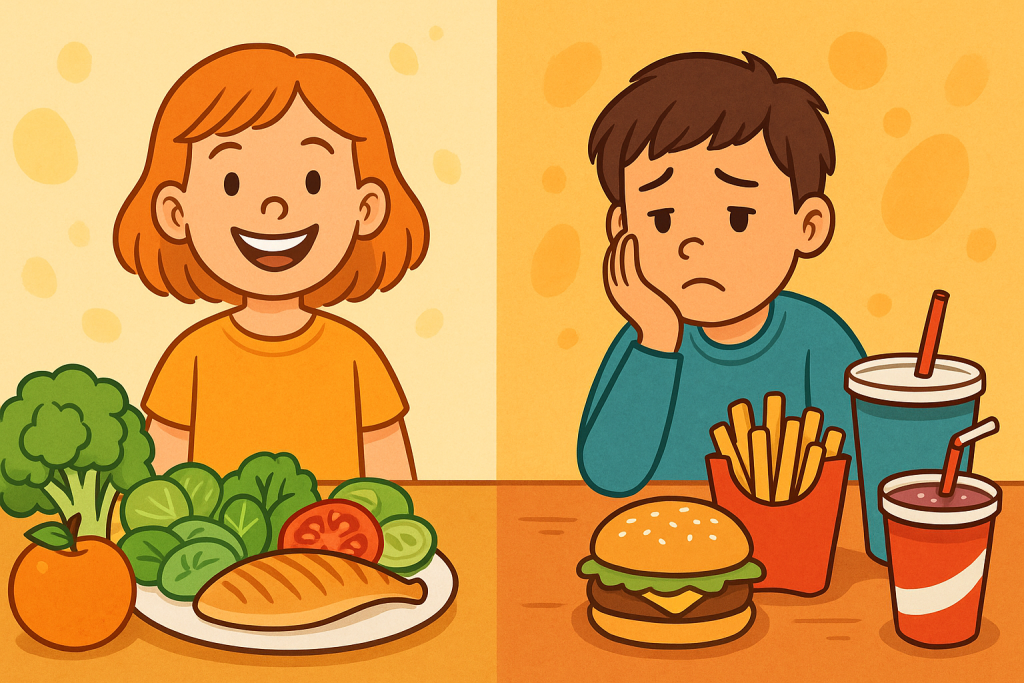Fast food is everywhere – cheap, tasty, and aggressively marketed to kids. But behind the convenience and colorful packaging lies a serious health threat for children. As parents and caregivers, understanding how fast food harms children’s health is vital for protecting their future well-being.
In this article, we’ll look at the real risks of regular fast-food consumption for kids, from obesity to chronic diseases. We’ll also offer tips on how to reduce reliance on fast food and encourage healthier eating at home.
📌 Why Is Fast Food So Appealing to Kids?
Fast-food chains use clever marketing to target children:
- Bright packaging and toys in meals
- Cartoon mascots and sponsorship of kids’ events
- Sweet, salty, and fatty flavors designed to be addictive
Children are particularly vulnerable to advertising, and busy parents may see fast food as an easy, affordable meal solution.
📌 Main Ways Fast Food Harms Children’s Health
1️⃣ Excess Calories and Childhood Obesity
Fast food is typically high in calories, unhealthy fats, and sugars. A single kids’ meal can deliver half or more of a child’s recommended daily energy needs. Regular consumption leads to calorie surplus, weight gain, and eventually obesity.
Childhood obesity isn’t just a cosmetic issue—it increases the risk of:
- Type 2 diabetes
- High blood pressure
- Joint problems
- Low self-esteem and bullying
2️⃣ Poor Nutritional Quality
Fast food is often low in:
- Fibre
- Vitamins and minerals
- Fresh vegetables and fruits
Instead, it’s rich in refined carbs, saturated fats, and added sugars. Kids who eat a lot of fast food often develop nutritional deficiencies, which can harm growth, brain development, and immune function.
3️⃣ Increased Risk of Chronic Diseases
While chronic diseases might seem like an adult issue, the foundations start in childhood. Diets high in fast food are linked to:
- Insulin resistance and early onset Type 2 diabetes
- Elevated cholesterol
- Heart disease risk factors
These health issues can persist into adulthood if poor eating habits aren’t changed.
4️⃣ Negative Impact on Mental Health
Emerging research links unhealthy diets to mental health problems in children and teens:
- Higher rates of depression and anxiety
- Attention problems
- Poorer academic performance
A diet dominated by fast food may deprive the brain of nutrients needed for mood regulation and learning.
5️⃣ Establishing Lifelong Unhealthy Habits
Eating habits are formed early. Children exposed to frequent fast food may:
- Prefer sweet, salty, and fatty foods
- Reject healthy options
- Continue these habits into adulthood
This makes it harder to adopt healthy eating later in life.
📌 Why Parents Should Be Concerned
Parents and carers want the best for their kids—but busy lifestyles can make fast food seem like an easy fix. Understanding the risks helps families make informed choices and prioritise long-term health over short-term convenience.
📌 Tips to Reduce Fast-Food Consumption
✅ Plan ahead: Prepare easy meals and snacks in advance
✅ Cook together: Involve kids in making meals so they learn healthy habits. See: 10 childrens snacks that parents love too.
✅ Make healthier swaps: Grilled instead of fried, water instead of sugary drinks, Lidl sell excellent tasting carbonated water.
✅ Talk about advertising: Teach kids how ads try to manipulate them
✅ Allow treats, but limit them: Don’t make fast food completely forbidden (which can backfire) – set sensible limits
📌 Final Thoughts
Fast food isn’t evil in small amounts—but making it a regular habit is a real danger to children’s health. By understanding the risks and making small changes at home, parents can protect their kids from obesity, chronic disease, and poor nutrition while teaching them a lifelong love of healthy eating.
✅ Encourage Healthy Habits, One Meal at a Time
Your child’s health today shapes their future. Let’s help them thrive with better choices—even in a world full of tempting fast-food options.

